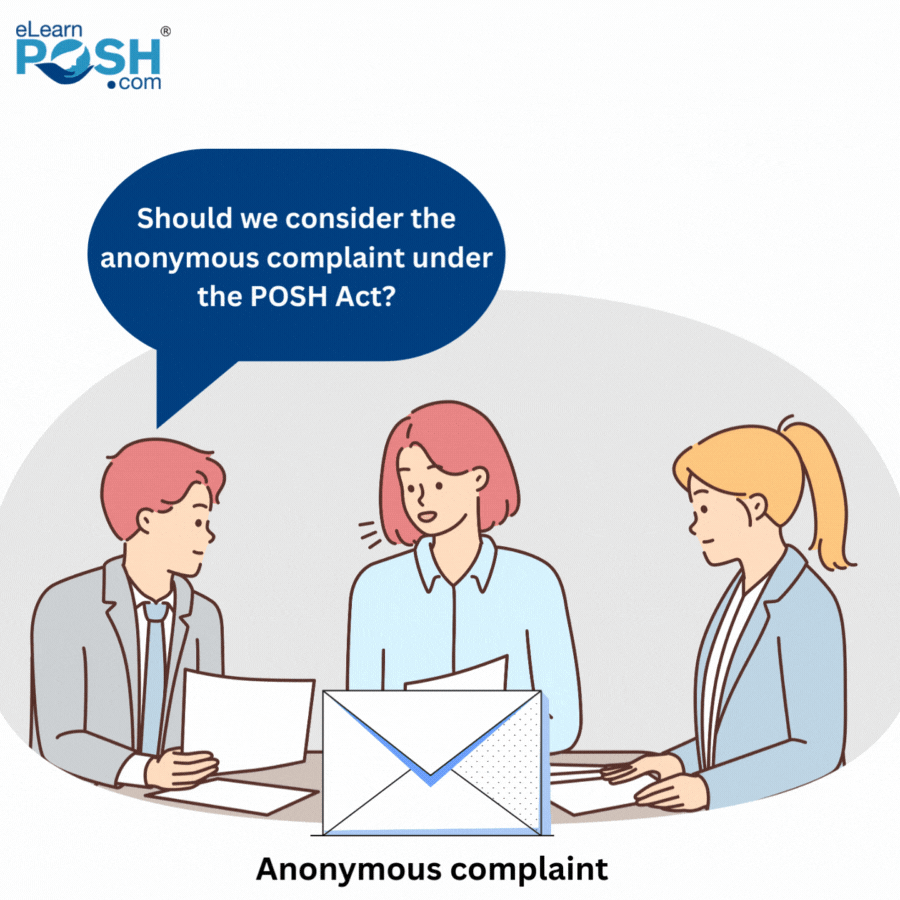
- What are Anonymous complaints?
- Can IC investigate into the Anonymous Complaint?
- Maintainability of Anonymous Complaints
- Why Should Organizations Pay Attention to Anonymous Complaints?
- What should IC do if Anonymous Complaints are received?
- Can IC inquire into complaints received under whistle blower mechanism?
- Best Practices
- Conclusion
Fear of retaliation, social stigma, lack of awareness or lack of trust in the Internal Committee. These are just some of the reasons why women employees opt to stay anonymous when reporting sexual harassment. They want their voices heard, but not their identities known. Yet they continue to await justice. This is the complex reality behind many anonymous complaints at the workplace.
The Sexual Harassment of Women at Workplace (Prevention, Prohibition and Redressal) Act, 2013, commonly known as the POSH Act, provides a structured mechanism for reporting and redressal of workplace sexual harassment through an Internal Committee (IC). However, the Act does not explicitly address how anonymous complaints should be handled. Therefore, the question persists: can the Internal Committee (IC) act upon anonymous complaints?
In this blog, we break down what anonymous complaints mean, how they are treated under the law, and what organizations can do to respond appropriately while staying compliant.
What are Anonymous Complaints?
An anonymous complaint refers to a grievance where the identity of the complainant is not revealed. It may come through:
- Suggestion or complaint drop boxes,
- Suggestion or complaint drop boxes,
- Anonymous emails,
- Whistleblower platforms,
- Unnamed reports forwarded by a colleague or HR.
Such complaints often describe instances of harassment or inappropriate behaviour but lack specific attribution to an identifiable person or to the one making the complaint.
Can IC Investigate into Anonymous Complaints?
The POSH Act does not specifically address the issue of anonymous complaints. In other words, it neither allows nor outlines a procedure for the Internal Committee (IC) to act on such complaints, causing a legal gap in this area.
However, the Act does prescribe the manner in which a complaint must be filed, to trigger an IC inquiry. Section 9 of the POSH Act clearly mandates the submission of a written complaint by the aggrieved woman within three months of the incident or, in the case of a series of incidents, within three months of the last occurrence. Further if the aggrieved woman is unable to file a written complaint due to physical or mental incapacity, the law permits the IC to provide assistance, or allows another person such as a friend, colleague, or legal heir to file the complaint on her behalf. Section 11 outlines the procedure for conducting the inquiry once a valid complaint is received.
The conjoint reading of above provisions makes it clear that the IC can initiate a formal inquiry only when the Complainant i.e., aggrieved woman files a valid written complaint as prescribed under Section 9 of the Act. Thus, the Act do not recognise anonymous complaints and consequently, the IC is not empowered to initiate an inquiry on the basis of anonymous complaints.
Maintainability of Anonymous Complaints
In addition to the IC lacking jurisdiction to inquire into anonymous complaints, such complaints are also non-maintainable in law for the following reasons:

1. Violation of Natural Justice: Rule 7(4) of the Sexual Harassment of Women at Workplace (Prevention, Prohibition and Redressal) Rules, 2013 mandates that the Internal Committee must carry out an inquiry in accordance with the principles of natural justice. This means the Respondent has the right to a fair hearing and an opportunity to respond to the allegations. If the identity of the complainant is unknown, the Respondent is deprived of the right to cross-examine the complainant and adequately refute the allegations. This undermines the Respondent’s right to a fair hearing and runs counter to the intent of the POSH law.
2. Lack of Evidence or Verification: Without knowing the complainant’s identity, it becomes difficult for the IC to verify facts, gather evidence, identify relevant witnesses, and ensure a balanced process for both parties. Initiating an inquiry based on vague or anonymous claims risks creating workplace speculation and spreading unverified rumours, which can unfairly damage the Respondent’s reputation, even when there is no substantiated evidence to support the allegations.
3. Potential for Frivolous or Malicious Complaints: Anonymous complaints could be misused as a weapon for frivolous or malicious accusations, driven by personal grudges or other motives. This not only puts the Respondent’s career and reputation at risk but also weakens the integrity of the redressal system.
Why Should Organizations Pay Attention to Anonymous Complaints?
While the IC cannot initiate a formal inquiry based solely on an anonymous complaint, organizations must not ignore them altogether. These complaints may still indicate that something is wrong, such as a toxic work culture, lack of trust in redressal mechanisms, or fear of retaliation.
What should IC do if Anonymous Complaints are received?
While IC cannot initiate formal enquiry based on anonymous complaints, the Internal Committee (IC) can still take certain constructive steps when such complaints are received. Here’s a suggested approach:
1. Assess the Mode of Receipt and Attempt to Reach Out (If Possible)
The IC should first examine how the anonymous complaint was received – whether by physical letter, dropbox, email, or another channel.
- If the complaint was received via email, the IC may reply to the sender, clarifying that under the POSH Act, the Committee cannot initiate a formal inquiry unless the aggrieved woman submits a written, signed complaint.
- The IC should assure confidentiality, explain the support mechanisms in place, and may encourage the individual to come forward with a formal complaint.
- If the individual still chooses not to disclose their identity or submit a written complaint, no formal inquiry can be conducted based on the anonymous complaint.
2. Conduct a General Awareness Session
In response to an anonymous complaint, the IC can organize a informal awareness session across the workplace, without targeting any particular department or a team and without disclosing the existence of the complaint. The session can cover:
- The requirement of a written complaint and the inability of the IC to enquire into the anonymous complaint in view of POSH Act.
- The confidentiality and non-retaliation protections available to complainants.
- A reminder that the IC is a neutral, safe body that upholds the privacy and dignity of all parties.
These sessions can play a crucial role in building employee trust and encouraging victims to speak up through proper channels and submit a written complaint as mandated under the POSH Act.
3. Circulation of General Advisory Emails
The organization can set up an official email communication channel that allows the Internal Committee (IC) to reach out directly to all employees. The IC can send a general advisory email highlighting what constitutes inappropriate behaviour at the workplace and encouraging employees to maintain respectful conduct. This approach helps reinforce awareness, clarify expectations, and remind employees of the consequences of misconduct, thereby promoting a safer and more respectful work environment.
Can IC Inquire into Complaints Received Under Whistleblower Mechanism?
Another common question is whether complaints received through an organization’s whistleblower mechanism can be investigated under the POSH law.
A whistleblower policy provides a framework for employees and other stakeholders to report suspected illegal, unethical, or misconduct within the organization. The primary goal is to promote transparency and accountability by encouraging the reporting of misconduct while safeguarding whistleblowers from retaliation. The policy sets up designated channels such as a specific individual, committee, or secure online portal where employees can report violations of laws, regulations, or company policies. Most whistleblower policies include provisions to protect the identity of the person reporting the concern, ensuring confidentiality throughout the reporting and investigation process.
However, it is important to note that an organization is mandated to handle complaints of sexual harassment strictly through its POSH policy with an IC being the appropriate authority to investigate into such complaints. If a complainant identifies herself through the whistleblower mechanism, the organization can still forward the complaint to the IC for formal inquiry in line with the POSH Act.
Nevertheless, if the complainant remains anonymous, the organization cannot proceed with a formal inquiry, as the POSH law requires a written complaint from an aggrieved woman to trigger the IC inquiry.
Best Practices
Here’s how organizations can balance legal compliance with workplace sensitivity:
- Use Anonymous Complaints as Red Flags: Treat anonymous complaints as a signal that there may be underlying issues such as fear of retaliation or lack of trust that discourage the aggrieved woman from filing a written complaint. The organization can respond by strengthening awareness sessions and building employee confidence.
- Strengthen Reporting Mechanisms: Establish reporting systems that are safe, confidential, and free from judgment or bias, ensuring that employees feel comfortable coming forward. Provide multiple accessible channels such as email, helplines, in-person reporting, or digital platforms so that individuals can choose the mode they trust most.
- Build Trust in the IC: Regularly communicate the role, training, and neutrality of the Internal Committee (IC) to all employees. Reinforce that, as per Section 16 of the POSH Act, the IC is legally bound to maintain strict confidentiality throughout the inquiry process. Assure employees that their identities and details of the complaint will be protected and emphasize that the organization has a zero-tolerance policy for retaliation against anyone who comes forward.
- Conduct Targeted Sensitization Programs: Reinforce acceptable workplace behaviour and the consequences of misconduct through focused training.
Conclusion
At eLearnPOSH, we believe that to uphold the principles of natural justice as envisaged under the POSH law, anonymous complaints cannot be treated as maintainable in law. Consequently, the Internal Committee (IC) should not conduct a formal inquiry based on such complaints. Likewise, without a formal written complaint from an identifiable aggrieved woman, the IC should avoid summoning employees or recording statements to determine the complainant’s identity or the details of the alleged incident. Doing so could lead to unnecessary rumours and may unfairly damage the Respondent’s reputation and career.
However, there are contradictory views from different High Courts on this issue. In Dipakkumar Dineshbhai Luhar vs State of Gujarat, the Gujarat High Court recognised the validity of preliminary action based on internal representations that were initially anonymous but later substantiated. In contrast, in Abraham Mathai vs State of Kerala, the Kerala High Court underscored the requirement of a clear, identifiable complainant to uphold principles of natural justice.
Nevertheless, despite the legal ambiguity the IC can still treat anonymous complaints as red flags and by conducting informal awareness sessions and circulating general advisory emails, the IC can remind employees about appropriate workplace behaviour and the importance of using the formal redressal mechanism, ultimately helping to prevent incidents of sexual harassment and promote a safer work environment.



Leave a Reply